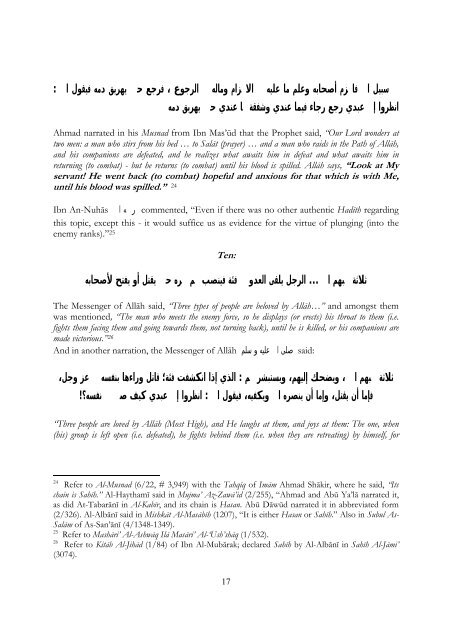the-islamic-ruling-on-the-permissibility-of-self-sacrificial-operations-suicide-or-martyrdom
the-islamic-ruling-on-the-permissibility-of-self-sacrificial-operations-suicide-or-martyrdom
the-islamic-ruling-on-the-permissibility-of-self-sacrificial-operations-suicide-or-martyrdom
You also want an ePaper? Increase the reach of your titles
YUMPU automatically turns print PDFs into web optimized ePapers that Google loves.
في سبيل االله فازم أصحابه وعلم ما عليه في الازام وماله في الرجوع ، فرجع حتى يهريق دمه فيقول االله :<br />
انظروا إلى عبدي رجع رجاء فيما عندي وشفقة مما عندي حتى يهريق دمه<br />
Ahmad narrated in his Musnad from Ibn Mas’ūd that <str<strong>on</strong>g>the</str<strong>on</strong>g> Prophet said, “Our L<strong>or</strong>d w<strong>on</strong>ders at<br />
two men: a man who stirs from his bed … to Salāt (prayer) … and a man who raids in <str<strong>on</strong>g>the</str<strong>on</strong>g> Path <strong>of</strong> Allāh,<br />
and his compani<strong>on</strong>s are defeated, and he realizes what awaits him in defeat and what awaits him in<br />
returning (to combat) - but he returns (to combat) until his blood is spilled. Allāh says, “Look at My<br />
servant! He went back (to combat) hopeful and anxious f<strong>or</strong> that which is with Me,<br />
until his blood was spilled.” 24<br />
Ibn An-Nuhās رحمه االله commented, “Even if <str<strong>on</strong>g>the</str<strong>on</strong>g>re was no o<str<strong>on</strong>g>the</str<strong>on</strong>g>r au<str<strong>on</strong>g>the</str<strong>on</strong>g>ntic Hadīth regarding<br />
this topic, except this - it would suffice us as evidence f<strong>or</strong> <str<strong>on</strong>g>the</str<strong>on</strong>g> virtue <strong>of</strong> plunging (into <str<strong>on</strong>g>the</str<strong>on</strong>g><br />
enemy ranks).” 25<br />
Ten:<br />
ثلاثة يحبهم االله ...<br />
الرجل يلقى العدو في فئة فينصب لهم نحره حتى يقتل أو يفتح لأصحابه<br />
The Messenger <strong>of</strong> Allāh said, “Three types <strong>of</strong> people are beloved by Allāh…” and am<strong>on</strong>gst <str<strong>on</strong>g>the</str<strong>on</strong>g>m<br />
was menti<strong>on</strong>ed, “The man who meets <str<strong>on</strong>g>the</str<strong>on</strong>g> enemy f<strong>or</strong>ce, so he displays (<strong>or</strong> erects) his throat to <str<strong>on</strong>g>the</str<strong>on</strong>g>m (i.e.<br />
fights <str<strong>on</strong>g>the</str<strong>on</strong>g>m facing <str<strong>on</strong>g>the</str<strong>on</strong>g>m and going towards <str<strong>on</strong>g>the</str<strong>on</strong>g>m, not turning back), until he is killed, <strong>or</strong> his compani<strong>on</strong>s are<br />
made vict<strong>or</strong>ious.” 26<br />
And in ano<str<strong>on</strong>g>the</str<strong>on</strong>g>r narrati<strong>on</strong>, <str<strong>on</strong>g>the</str<strong>on</strong>g> Messenger <strong>of</strong> Allāh صلى االله عليه و سلم said:<br />
ثلاثة يحبهم االله ، ويضحك إليهم، ويستبشر م :<br />
فإما أن يقتل، وإما أن ينصره االله ويكفيه، فيقول االله<br />
الذي إذا انكشفت فئة؛ قاتل وراءها بنفسه الله عز وجل،<br />
: انظروا إلى عبدي كيف صبر لي نفسه؟!<br />
“Three people are loved by Allāh (Most High), and He laughs at <str<strong>on</strong>g>the</str<strong>on</strong>g>m, and joys at <str<strong>on</strong>g>the</str<strong>on</strong>g>m: The <strong>on</strong>e, when<br />
(his) group is left open (i.e. defeated), he fights behind <str<strong>on</strong>g>the</str<strong>on</strong>g>m (i.e. when <str<strong>on</strong>g>the</str<strong>on</strong>g>y are retreating) by him<strong>self</strong>, f<strong>or</strong><br />
24<br />
Refer to Al-Musnad (6/22, # 3,949) with <str<strong>on</strong>g>the</str<strong>on</strong>g> Tahqīq <strong>of</strong> Imām Ahmad Shākir, where he said, “Its<br />
chain is Sahīh.” Al-Haythamī said in Mujma’ Az-Zawā’id (2/255), “Ahmad and Abū Ya’lā narrated it,<br />
as did At-Tabarānī in Al-Kabīr, and its chain is Hasan. Abū Dāwūd narrated it in abbreviated f<strong>or</strong>m<br />
(2/326). Al-Albānī said in Mishkāt Al-Masābīh (1207), “It is ei<str<strong>on</strong>g>the</str<strong>on</strong>g>r Hasan <strong>or</strong> Sahīh.” Also in Subul As-<br />
Salām <strong>of</strong> As-San’ānī (4/1348-1349).<br />
25 Refer to Mashāri’ Al-Ashwāq Ilā Masāri’ Al-‘Ush’shāq (1/532).<br />
26<br />
Refer to Kitāb Al-Jihād (1/84) <strong>of</strong> Ibn Al-Mubārak; declared Sahīh by Al-Albānī in Sahīh Al-Jāmi’<br />
(3074).<br />
17


